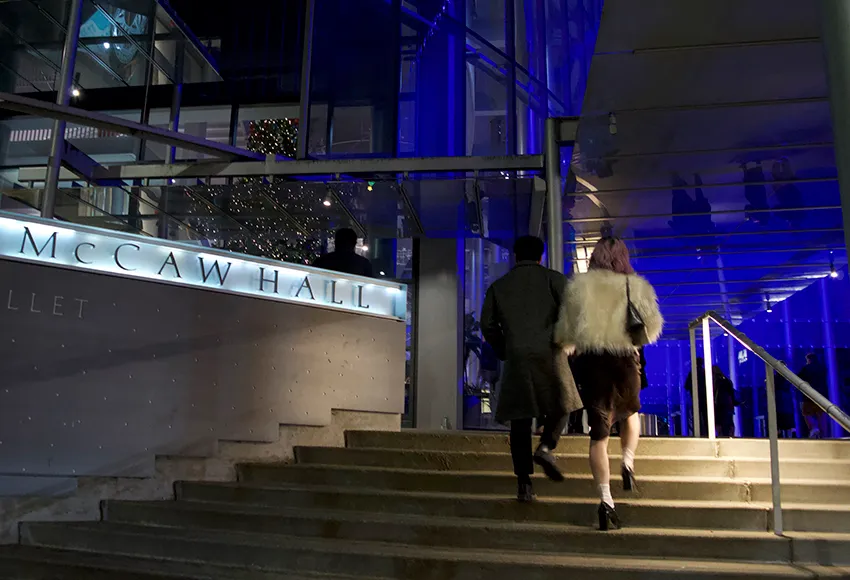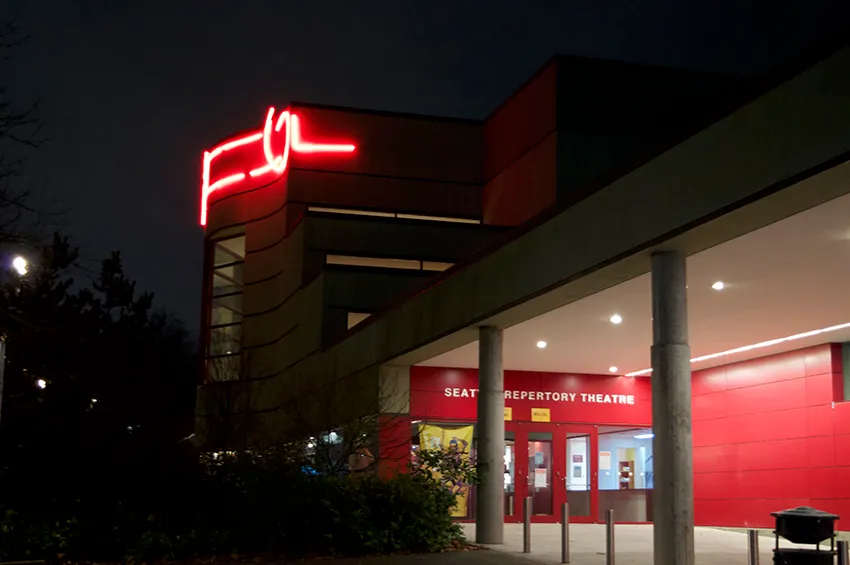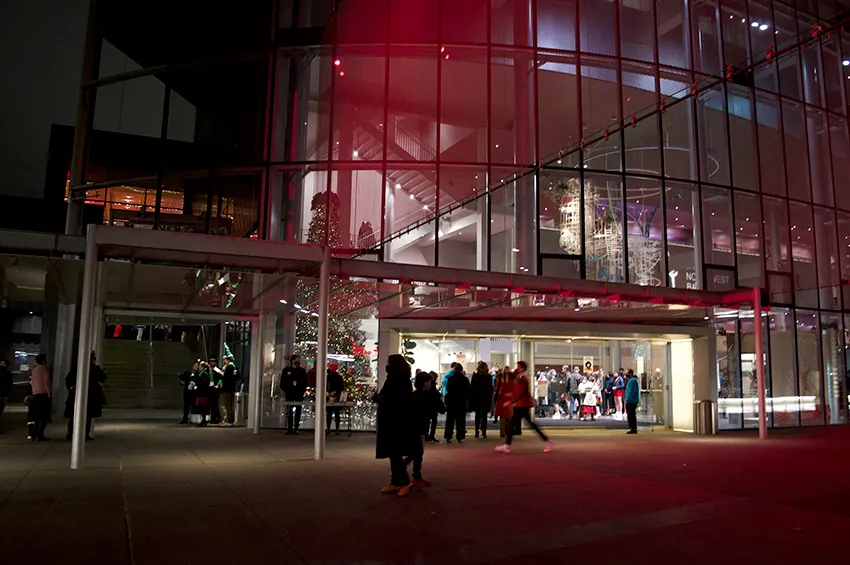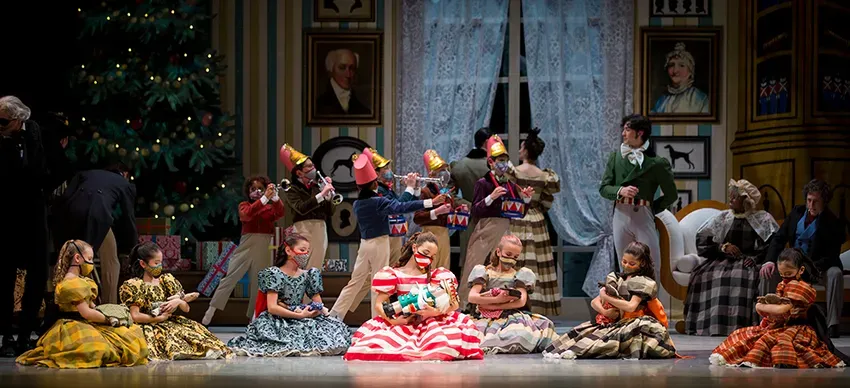This autumn, several Seattle-based performing arts organizations opened their venues with in-person productions for the first time since the COVID-19 pandemic struck in late winter 2020. Eager to welcome audiences back into their spaces, many of these organizations considered their fall performances to be like test runs for how productions would go for the rest of the year, allowing them to take the first steps into what was once second nature.

"Our fall and holiday productions were absolutely test runs for us," Gary Tucker, director of communications for the Pacific Northwest Ballet, told the SGN in an email. "As the first performing organization back in McCaw Hall following the shut-down, we definitely took baby steps before finding our stride."
Prior to its current production and holiday staple, The Nutcracker, the PNB hosted two productions, one in September open only to subscribers, and another in November for socially distanced audiences. Tucker said these allowed PNB to put "some experience under our belts," and continue with The Nutcracker and its production of Romeo et Juliette, planned for February.

"Our first live performances in our building are coming up in January, and I'm excited. It's hard to believe that it's been almost two years," Jeffrey Herrman, managing director of Seattle Repertory Theatre, told the SGN. The theatre hosted its first live audiences at the Cornish Playhouse last weekend for a screening of Shakespeare's The Winter's Tale, filmed over the summer. "As we're starting to ramp up, it's like, how do we do this again? I think everybody's like, 'I sorta remember how to produce a show,' but you have to kind of figure it out all over again."

Uncertainty stirs amid already tight production regimens
With recent concern over the emergence of the highly contagious Omicron variant, potential cancelations are plaguing these organizations yet again. In New York City, major productions, including the Rockettes and Saturday Night Live, shut down their remaining holiday shows at the last minute in response to rising cases in the Big Apple. Now, across the country and here in King County where new COVID-19 cases are averaging 515 per day, organizations dedicated to bringing the public together in the name of art and entertainment might face the same fate.
"I'm just seeing a lot of cancelations starting to happen again. I'm concerned about what that means for our reopening in the middle of January," Herrman said.
"A reality that we all need to face is that... as much as we've managed to get through most of December thus far and keep things going, we don't know what will happen as the winter progresses," Samantha Berry, marketing and sponsorship manager for Seattle Choruses, told the SGN. "Winter is a rough time for the sick season, and the Omicron [variant] has definitely brought concern to a lot of people."
Berry said the chorus had received messages from patrons prior to concerts indicating that they had to forgo their planned attendance due to concern over COVID-19 exposure.
"All we can say is that we're taking these precautions, and that of course, we want them to feel safe. So it is entirely up to them what they decide to do with their time and space," Berry said.
When the Delta variant was raging in Seattle, arts organizations had to drastically change their production processes. Rigorous biweekly PCR testing and rapid tests were required of cast, crew, choir, and orchestra members of the organizations that spoke with the SGN, adding more expenses to productions.
For The Nutcracker, PNB had to reduce the number of children in the cast, requiring several students to fill different roles for each act, and the costume shop had to create masks for the children to wear.
Similarly, in ACT Theatre's production of A Christmas Carol, no cast members are under the age of 12, ensuring that all company members are vaccinated. ACT also included health and safety protocols in the pre-show speech, and created the role of a narrator, who would welcome the audience while masked.
As part of their holiday concert series Snow Business, all members of the Seattle Men's Chorus are masked while performing, except soloists, who are tested prior to their on-stage performance.
"Because of the size of the cast and the population that we work with, which tend to be marginalized folks, I think there was a particular worry about COVID, and transmission of disease," Herrman said of The Winter's Tale, which relied on cast participation from local groups, including the Boys and Girls Club, the Ballard Senior Center, and Jubilee Women's Center.
"This pandemic has been particularly cruel when it comes to this particular program, right? Because it's all about assembling a huge [number] of people together to make a play... This is what the pandemic hasn't allowed us to do."
Organizations and ticket buyers taking wait-and-see approach
Unfortunately for many area performing arts organizations, uncertainty surrounding the Omicron variant has forced them to stick with a wait-and-see approach that has become the industry's COVID-19 status quo. Despite this, in-person productions are still planned.
"The one thing we've learned from this whole COVID pandemic is the need to be flexible and to assume that everything is subject to change. So we remain optimistic that things are on the path toward 'normalcy,' but with the understanding that the 'new normal' is not the same as the 'old normal,' and protocols will remain fluid for the foreseeable future," Tucker said.
As holiday productions wrap up and early winter approaches, organizations are also taking the time to quickly reflect and rework their upcoming performances.
"I think we're all feeling really good about how this has gone thus far with the first production back," Berry said. "It's constantly a learning process. We're going to be sitting down and doing a sort of defrag of: how did everything go, what went really well, what didn't, and taking any suggestions into consideration that come up during that.". The Seattle Women's Chorus is expecting to showcase its girl-group and sister-acts-themed We Are Family concert series in early February.
Herrman noted that the Seattle Rep and other venues have experienced more last-minute sales of tickets instead of traditional advance purchases, another curveball for these venues.
"What we're seeing from our colleagues is that people are doing just fine. It's just that those sales are happening very close to the actual performance," Herrman said. "Which is terrifying for live venues, right? We like to know that there are going to be people in the house, and we're used to having these advance sales to give us a sense of what we're doing, and people are just making decisions much closer to the performance. And that's okay, that's just the dynamic that we're in right now, and I expect that's what we'll see once we get into the new year."


